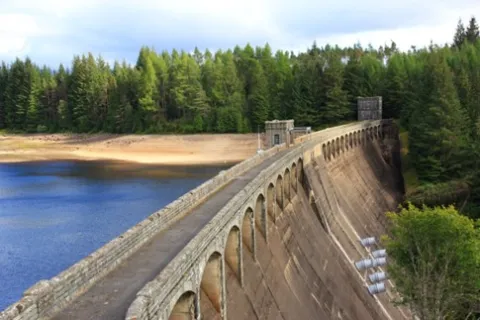
In line with the Scottish Government's goal of achieving net zero emissions by 2045, a new CREW project carried out by researchers at the University of Glasgow and CBEC eco-engineering is shedding light on sediment management in hydropower operations. This initiative aims to raise awareness about the impact of sediment delivery to hydropower structures and explore the potential economic implications of these changes, particularly in the face of climate change.
Background and Scope
The project builds upon an earlier CREW study, Sediment continuity through run-of-river hydropower schemes | CREW | Scotland's Centre of Expertise for Waters which was the first of its kind to assess the impacts of sediment continuity on run-of-river hydropower structures in Scotland. The study revealed a highly variable impact on sediment continuity, with some cases showing significant implications for project resilience and sustainability. While this earlier research provided valuable insights, it also revealed significant knowledge gaps, particularly concerning the financial ramifications of sediment management issues. The current project aims to address these gaps by engaging hydropower operators across Scotland through outreach activities and conducting a comprehensive cost-benefit analysis of sediment management practices.
Project Objectives
The project has two primary aims:
- Raising Awareness: Improve understanding in the hydropower sector on basic river geomorphological processes and the impact of sediment continuity (or discontinuity) for river habitats and species.
- Understanding Economic Impacts: Highlighting the commercial risks and benefits associated with different sediment management options, especially considering increased sediment delivery due to climate change.
Achieving these objectives is expected to streamline the permit process for hydropower operators and regulatory bodies like SEPA (Scottish Environment Protection Agency), ultimately contributing to more sustainable hydropower operations in Scotland.
To facilitate this, a stakeholder workshop was held at the University of Glasgow. The workshop provided a platform for meaningful dialogue among 20 invited stakeholders from the hydropower sector, including representatives from industry, NGOs, environmental consultants, and public agencies. The discussions were led by an independent facilitator and centred around four core activities.
Activities and Key Insights
- Sediment Management Challenges: Participants discussed their experiences and knowledge gaps regarding sediment management. Key insights included the need for clearer regulatory guidelines, better design considerations for hydropower structures to handle sediment and more collaborative approaches to managing sediment continuity.
- Impacts and Best Practices: Stakeholders addressed the financial and environmental costs of different sediment management practices, with stakeholders identifying both proactive and reactive measures. The costs associated with different practices varied significantly, underscoring the need for a comprehensive cost-benefit analysis.
- Case Study Scenarios: Groups analysed hypothetical hydropower scenarios to explore environmental and operational impacts of sediment transport, considering future climate change projections. The discussions revealed concerns over potential damage to hydropower structures and the increased costs of sediment management, which could threaten the financial viability of some schemes.
- Communication Strategies: The workshop concluded with brainstorming on effective ways to communicate sediment management challenges to a broader audience. Participants suggested various formats, including videos, infographics, interactive animations, and social media content.
Outcome and Moving Forward
Feedback from the workshop highlighted the need for a collaborative approach with proactive sediment management strategies. Participants emphasized the importance of clear, focused regulatory frameworks and educational initiatives from regulators.
As the project progresses, the insights gained from the workshop will inform the development of practical guidelines and communication materials to support the hydropower sector in navigating sediment management challenges. By directly engaging stakeholders, the project aims to align hydropower practices with Scotland's net zero aspirations, ensuring resilient and sustainable energy production for the future.
The ongoing engagement and dissemination efforts (including a video, report and infographic) will be crucial in transforming awareness into action, enabling Scotland's hydropower sector to adapt effectively to the evolving environmental landscape. Watch this space for project outputs, including a report, plain language summary, and a video highlighting basic river processes and how they relate to sediment management by hydropower schemes.
CREW would like to thank the research team (University of Glasgow and cbec- eco-engineering) and the Project Steering Group (SEPA, NatureScot, and Scottish Canals) for their dedication and support to the project and in addressing this important issue.